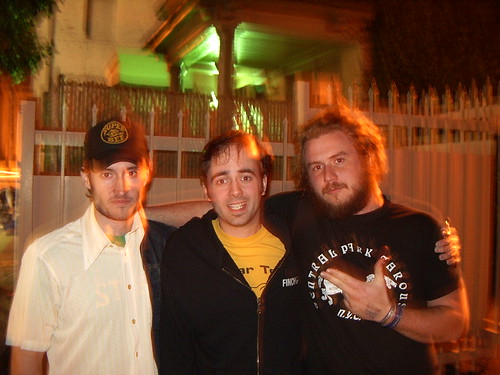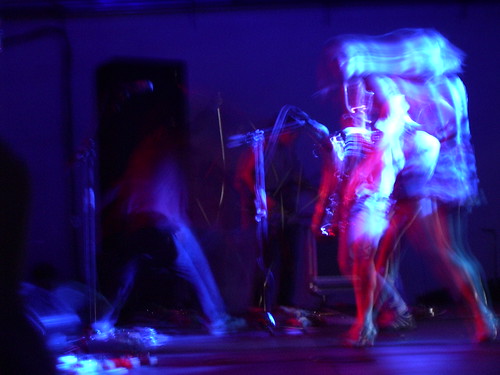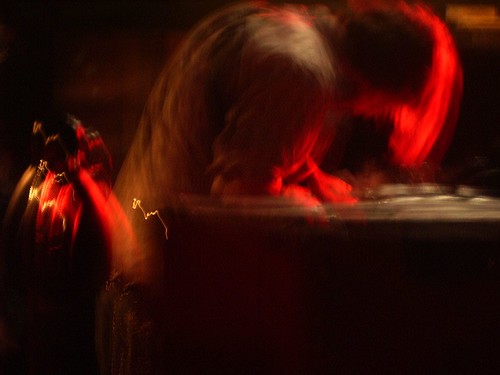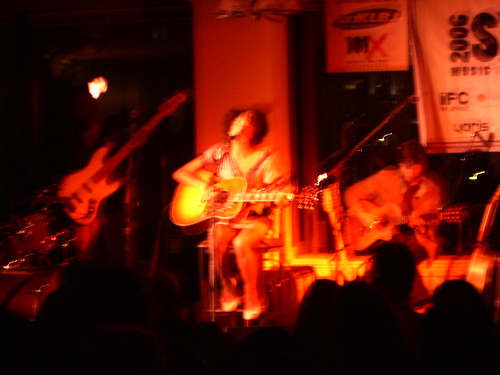[This feature ran in the first issue of our
Loose Lips Sink Ships, February 2004. A long one, but one of my best...]

When was your first time in jail?
“I was twelve years old... It was for shoplifting. Shoplifting booze, heh heh heh.”
Have you always been attracted to trouble?
“‘Attracted to trouble?’ No. It’s been attracted to me.”
Has it always been attracted to you, then.
“Well… Less and less, as time goes on.”
I first saw Mark Lanegan on No Nirvana: Nevermind, a Late Show special on BBC2 somewhere past midnight, in the plaid-shirted early 90s. I still have it somewhere, on ratty old videotape, his band Screaming Trees launching into their torn, noble regret anthem ‘Dollar Bill’. Lanegan haunts the foreground, leaning into the mic-stand like it’s holding him afloat through frenzied waters, the colossal Conner brothers rocking out behind him, bulky fingers squeezing barbs of melody from the melee. Adrift from his bandmates’ ecstatic writhing, Lanegan’s movements are only barely measurable, but potent; cadaverous tresses of seaweed-coarse blonde hair hanging lank, lips struggling to part with each word, and those eyes… So dark they don’t reflect any light, focussed fissure-tight and sunk so deep and sullen into his face you sense no hope resides there. The shrouded vacuum beneath his brow seemed to suggest some forbidding wisdom, some awful truth traditionally hidden in the essentially anodyne realms of modern rock’n’roll.
A penchant for regularly testing the limits of his mortality with poisons and his fractious relationship with the law have hewn a legend, thorny with whispers and gravely shadowed, about him. Beyond that infamy lies the voice, flickering tones weathering over twenty or so years into a rich and complex instrument, composing a burnished gothic grandeur for his lauded solo albums, or, for Screaming Trees’ ‘Sweet Oblivion’, absolving the heroic denim-fringed guitar workouts into the definitive treatise on a ‘blues’ that weighs deeper than mere guilt and regret; words sung like their weight was wearing bloody grooves into his spine, a fallen man nevertheless straining for some nobility in bearing what he has wrought.
“I remember working at a diner, mouthing off to these guys there that I was a better singer than Dave Lee Roth. That weekend, they screeched into the diner carpark and hollered, ‘Lanegan, you’d better not have been bullshittin’!’ They dragged me to some party where there band was playing, and I sang through a set of covers. We must’ve played ‘Dancing Days’ by Led Zeppelin a dozen times that night…”
Mark Lanegan sits in a threadbare armchair, backstage at the Birmingham Academy, where his Mark Lanegan Band are headlining tonight, cradling an iPod, scrolling through the menus to tell us what he’s been listening to of late: PJ Harvey; Greg Dulli’s Twilight Singers; (smog); Azure Ray; Cat Power; Martina Topley-Bird; PW Long, whose ‘Remembered’ album Lanegan says helped save his life this year. Of slim build, athletic almost, his hair cut short and bristly, his eyes bright and alert and his skin shades warmer than the cement pallor he used to sport, he looks nothing like the wraith he was; saved indeed. Only his hands give away the indiscretions of his past: red, blotchy and swollen like an old lady’s legs, and decorated with rows of blue stars tattooed over his knuckles and fingers.
He flashes these little smiles that you never see in photographs of him – almost conspiratorial, eyebrow arched – smiles boyish in their unguarded intimacy, mannish in that you sense they’re being rationed out, to keep people at a distance and preserve the solitude you sense a peripatetic life beset by tragedy and chaos has taught him to treasure. He has few real close friends, you imagine, and perhaps fewer every year, but those relationships run deep, to death.
The stone-faced silence Mark has greeted interviewers with in the past is absent today, maybe thanks to the presence of snapper Steve Gullick, an old and dear friend; but, also, Mark no longer has to struggle to be taken seriously, thanks to the respect garnered by his revered solo releases and commercially-consolidating sessions with Queen Of The Stoneage. But those days with the Trees, toiling in some kind of undeserved obscurity, have left their marks on Lanegan. While on this tour in support of his excellent new EP, ‘Here Comes That Weird Chill’, he’s also hooking up with old friends at Sony Europe, to hammer out details for a box-set covering Screaming Trees’ major label releases. Such respect is a long time coming.
“Sony America released this ‘Greatest Hits’,” he scowls, “It was hideous: no sleevenotes, horrendous cover, and the worst selection of songs. It’s a real shame … If you go to the Northwest and ask guys – well, most of them aren’t around now – but if Kurt Cobain was around to ask, or Layne Staley, they’d tell you we had a profound influence on the bands of the Northwest. And I feel that the fellas and myself didn’t get our due.”
Mark Lanegan and Van Conner met, somewhat poetically, while on detention in High School, in Ellensburg, Eastern Washington. In a small country town, where no-one had long hair, no-one had tattoos and, certainly, no-one listened to punk-rock, Van Conner was a misfit, physically huge and perpetually dressed in a raincoat topped-off with a U2 badge, which was pretty daring for Ellensburg. Lanegan, already a heavy drinker and dabbling in drugs and trouble, didn’t fit in either, and the two bonded over music. Soon, Lanegan was manning the lights for the band Van formed with brother Gary Lee and, after a short stint in jail for theft and drug possession, working for the Conner’s parents, repossessing TVs from trailer parks.
When the Conner brothers tired of playing covers at local dance parties, they hooked up with Lanegan, who soon swapped his initial drumstool for the microphone stand, and formed the Screaming Trees. Moving swiftly, with the aid of friends like producer Steve Fisk and Beat Happening’s Calvin Johnson, the band released a slew of EPs and LPs throughout the 1980s on labels like Velvetone, Homestead, Sub Pop and, most prolifically, SST. Mark chalks their impressive work rate to poverty; “We’d come off the road and record an album for the $1000 advance SST were offering us, because we needed the money to go back on the road.”
Mark certainly doesn’t view their early days with excessive romance. “Those SST records were a mishmash,” he grumbles. “I was singing parts that the guitar player had written, in a higher register than mine; I was always walking offstage with a splitting headache. He was really into a psychedelia thing, which I wasn’t into. He hadn’t even eaten acid, which I’d been selling for a number of years.”
While he’s certainly overly harsh in his judgement of Screaming Trees’ SST years – everyone should own the brutish garage-fuzz of ‘In The Forest’, the karmic psych-out of ‘Black Sun Morning’ and the stoned, immaculate sublime of ‘Gray Diamond Desert’ – it wasn’t until the band signed to Epic that they made good on all their promise. Their first for Epic, the Chris Cornell-produced ‘Uncle Anaesthesia’, was something of a misfire – “It was dismal,” says Lanegan now – but it allowed Mark to take Screaming Trees’ creative reigns from thereon in.
“I’d made my first solo album by then,” remembers Mark. “I’d quit the band a number of times, but said I’d return for one more album, but we’d have to do it my way. ‘Sweet Oblivion’ was the first where I wrote all the words, and it ended up being our most successful one. Then things went crazy for a while, we were on the road for a couple of years; by the time we made ‘Dust’, everything was in disarray.”
1996’s ‘Dust’, produced by George Drakoulias, should’ve been the album to break the Trees ‘big’, but, for many reasons, it never happened that way. Another year or so of crazy touring followed, but the band were in a bad way; internal relations between the members were frayed beyond repair, and Mark’s drug habits were spiralling out of control (it was while touring this album that he was arrested in possession of crack cocaine). A few years of silence, save for the odd local show, followed, until, after a June 2000 show to celebrate the opening of the Experience Music Project in Seattle, they announced they had split.
“The fucking odds were against us,” Mark sighs. “It was perverse. I realised what utter underdogs we were, and that just made me wanna succeed with it, put superhuman amounts of effort into this losing battle. I came to realise in time thought that I was the only guy in the group that did that, that the other guys didn’t work as hard, and that they just didn’t care about it as much as I did.
“I had my share of personal problems as well. I kind of liken the whole experience to Fitzcarraldo, it was like hauling a boat over a mountain. I worked real hard at it for a long time, and I will probably never work as hard at anything again, nor would I want to. Some battles you just have to surrender.”
By the time Screaming Trees finally imploded, Lanegan was already four albums into a solo career that had garnered more respect and plaudits than anything Screaming Trees had released. The first, 1990’s ‘The Winding Sheet’, was originally planned as an EP of blues songs recorded with friends (and then unknowns) Kurt Cobain and Krist Novoselic, later morphing into an unlucky thirteen sprawl of mainly-acoustic mourns, crafted by producer Mike Johnson (a molten take of Leadbelly’s ‘Where Did You Sleep Last Night’ remains from the Cobain session). Lanegan’s voice was a revelation, powerful yet vulnerable, something deeper than mere rock’n’roll.
“I remember photographing you in Seattle, and you said Screaming Trees were more important to you than your solo stuff,” begins Steve Gullick. “That struck me as odd; I loved the Trees, but your solo albums…”
“I wasn’t telling the truth,” murmurs Mark. “I was making a lot more money from my solo albums, but I was trying to convince myself the Screaming Trees were worth all the effort I was putting in. I probably shouldn’t have worked so hard at it…”
1993’s follow-up, ‘Whiskey For The Holy Ghost’, is perhaps the definitive Lanegan solo album, and Mark’s own personal favourite. Pieced together from sessions covering four tumultuous years of Lanegan’s life, during which time Mike Johnson quit the project, it sprawls from the epic and thunderous ‘Borracho’ to haunted fragments like ‘Riding The Nightingale’, an album etched with violins and acoustic guitars and brooding standup bass, and tempos slowed enough for Lanegan’s vocals to ooze richly from the speakers. “Felt much older than I really was,” he sings on ‘El Sol, and he certainly sounded that way too.
Lanegan waited five years for the follow-up, Scraps At Midnight. “At the time I was in a Halfway House situation in California. It was sort of like a rehab situation, it’s a structured living environment where there’re rules, and it’s halfway between jail and society. It’s meant to get you to a place where you can live outside and not break the rules. It hasn’t succeeded 100%, that’s the challenge, but it succeeded. I got out on a three-day pass and met Mike Johnson at Studio Rancho in Joshua Tree. We wrote the material on the spot, cobbled it together; it was an exercise in letting go. I hadn’t seen Mike for a couple of years and we reconnected, but that was it. The next two records, he had very little to do with.”
Around this time, Josh Homme, ex-Kyuss and one-time Screaming Trees sideman, invited Lanegan to front his new band, Queens Of The Stoneage. Sequestered in the halfway house, Lanegan had to refuse, but a crucial link was made.
“I wasn’t able to play on that first record, and in retrospect I’m really glad that’s the way it happened, because it would have been different,” reflects Lanegan, of the sylph-throated slo-mo quicksilver that was Queens’ self-titled, sublime debut. “The success of that record gave him the confidence to make ‘Rated R’, and I was glad to be a part of that. I sang backups on half that record and I was there for half of it.”
Were you reluctant to be joining a band again, after your experience with Screaming Trees?
“No, not that at all. In fact I’ve always preferred being in a band, but I didn’t want it to be an unhappy experience. I’d been in this other band for a really long time, and it was a band of people who really disliked each other a lot, beginning with two brothers who disliked each other. There was always this threat of violence and a lot of dysfunction and unhappiness. I didn’t want to experience that again. It took convincing on his part that I wasn’t tying myself to a rock that was going to the bottom of the ocean. It’s been one of the most rewarding situations I’ve ever been in, and I don’t mean because of its success,” he says, smiling, the contrast with the Trees immediately apparent, “but because its one of the rare beasts in that its good, but it also has the ability to obviously get through to a lot of people, so it’s not marginalised.
“Mainly it just grew out of my friendship with Josh. It’s grown in stages, sometime reluctantly on my part. I have a job that nobody else in rock has... It’s like when I played baseball and I was a relief pitcher, I had to just come on and do my thing when needed. It felt weird at first because I’d never seen anyone else do it, but it wasn’t weird to him, to his credit. It really does work the way he envisioned it.”
So, to The Mark Lanegan Band, then. The title is something of a misnomer; in place of a static, solid line-up, The MLB, for the purposes of ‘Here Comes That Weird Chill’ at least, is a fluid coterie of friends, including Josh Homme, Nick Oliveri, Greg Dulli, and Chris Goss, of Masters Of Reality fame. Fittingly subtitled ‘Methamphetamine Blues, Extras and Oddities’, its thirty or so minutes of obscura finds space for crunching industrial eerieness (‘Methamphetamine Blues’), haunting, fragmentary hymnal (‘On The Steps Of the Cathedral’), an incandescent Beefheart cover (‘Clear Spot’), soul-saturating piano-led gospel (‘Lexington Slowdown’), and ‘Skeletal History’, a chilling descent into squalor taking in hookers and hypodermics, over a spasming tungsten-punk groove.
“For a short while I had a band with Duff McKagen, and some of the stuff I did with him was sorta like that,” he says of ‘Skeletal History’, which dominates the EP like a tumour. “I call it my Saccharine Trust song. To me its one of the most real kind of songs I have, the most honest.”
‘Methamphetamine Blues’ is a decided departure from the dust-etched austerity of the rest of Lanegan’s solo output, as if his excursions alongside QOTSA have re-engaged Mark’s interests in a harder-edged, more explicitly ‘rock’ music. The slow-burning, brodding majesty remains, and that voice – steeped even deeper in sin and despair and more fearsome and chilling than ever – but the mood is more raucous, more vicious than the other albums’ after-midnight, tumbler-fulla-whiskey ruminations (although Lanegan says he’s only had one drink in several years, on a flight to California following his divorce a couple of years ago. Once told by his doctor, aged twenty, that his booze habit would ensure he never saw his thirtieth birthday, Lanegan quips half-seriously that heroin “Saved me from becoming an alcoholic”).
The route to ‘Methamphetamine Blues’ took in two further solo releases: 1999’s elegiac ‘I’ll Take Care Of You’, a moving and dark covers suite including songs by Fred Neil, Buck Owens and his departed friend, Gun Club-singer Jeffrey Lee Pierce; and 2001’s bleak ‘Field Songs’ (opener ‘One Way Street’, with its refrain “Can’t get it down without crying,” is maybe Mark’s most gloriously downbeat mourn; ‘Kimiko’s Dream House’, meanwhile, is unimaginably delicate, and dreamy like doo-wop).
‘Field Songs’ marked the end of Lanegan’s collaborations with Mike Johnson, and Soundgarden bassist Ben Shepherd, who shaped the last two albums like Johnson had the first two.
“I said I didn’t want to make that same kind of record anymore,” remembers Mark. “I considered them all rock records, but I noticed people thought of them as blues records or folk records, and that’s just not interesting to me. I didn’t want to make something that was so rooted in period that it was a genre-exercise. I wanted to make rock’n’roll records, my kind of rock’n’roll records. I listen to a lot of different kinds of music, and very little of it is rooted in the past. Mike in particular was not interested in doing anything that was ‘unsafe’, y’know? That’s no slam on him at all, he makes wonderful records and all those records bear his stamp, and I’m very proud of and love the music we made together. But I wanted to do something else.”
“Something else”. Sitting eating breakfast with Mark the next morning, as he tucks into a plate full of eggs, bacon, hash browns and tomatoes, I sense that his horizons probably haven’t seemed so limitless for a long time. The night before, his touring Mark Lanegan Band backed him for a set that was majestic, dark, and bitter, a set of songs from his solo career – no Trees songs, unlike his execrable last UK show at the Astoria, late 2001, 40 minutes including cursory and bloodless encore of ‘Gospel Plow’. Numbering ex-members of Ween, A Perfect Circle and Caustic Resin, this version of the MLB aren’t as stellar as the A-List cast on the album, but they’re fine at segueing between the moods of the show, from a turbulent ‘Barracho’, to a sleazy and unpleasant ‘Methamphetamine Blues’.
This morning, Mark’s buzzing at the prospects lying before him. There’s talk of more work with Martina Topley-Bird (he guested on her debut ‘Quixotic’), of collaborating with PJ Harvey on her next album. Upon returning to the States, Greg Dulli will be joining the band as keyboard player, and afterwards he and Greg are taking ten days off together to record their long-mooted Gutter Brothers project.
“The very week I was offered the Queens gig, Greg and I had time booked in Memphis, with the Hi Rhythm Section as our backing band,” winces Mark. “It was paid for and everything, that was our window of opportunity, and I chose to do Queens instead. But we’re gonna finally do it. I don’t know what’s gonna happen. I’m excited. He wrote some songs for me to sing, I wrote some for him to sing, and we chose covers for the other guy to sing.”
How did you react when you were told, aged 20, that if you kept living the way you were living, you wouldn’t see 30?
“I reacted the same way that Jeffrey Lee Pierce reacted when they told him he was gonna die. In early 1996, he went to Japan, and right before he left he and I were at his mom’s in LA writing songs. He seemed in really good health –sometimes he wasn’t in such good health, sometimes he could barely walk because he was so fucked up.
“When he came back from Japan, he left me a couple of messages on my answerphone. He sounded completely out of his mind, though not like he was drunk. It was strange, like he’d gone crazy; finally I got hold of someone, and she told me Jeffrey had come back, that he’d been drinking while he was gone, and his liver had sent poisons through his system, and he was experiencing dementia. The hospital turned him away saying, there’s nothing we can do for him, his liver’s shut down, he’s dying.
“After this, I get a call from him; he was up in Utah, and he sounded normal. And I said, what the hell, man, everyone’s saying you’re going to die. And he said, they always say that. And a week later, he fell into a coma and died.
“So, that’s how I reacted. You don’t actually believe that stuff; you feel okay, and all that. I didn’t think twice. I probably would today, if they told me. I would probably take it a lot more seriously.”
You say the halfway house helped you clean yourself up. But you must’ve made a decision yourself, to get clean?
“Well sure. I mean, there was a time when I thought I didn’t have any choice in the matter, when I spent almost a year in various ‘situations’: jail, rehab, halfway house. And just through the sheer fact that I wasn’t able to get outside, so to speak – and also because I really just did not want to live that way any longer – for me it wasn’t hard. It was the end of a nightmare that had lasted for years and years. I had always hoped that I would be able to stop, but I never was able to. Eventually, I was. A lot of that had to do with changing my way of thinking on a great many things; again, some battles you just have to give up. I was pretty stubborn, I thought I could do a lot of things myself. Nobody likes to believe that they need anybody’s help in anything, and the smarter you are – and I’m not smart – or the tougher you are – and at times I thought I was pretty tough – the more trouble you have. The smartest guys I ever met are not around anymore, because they thought they could think their way out of an unthinkable situation, and the tough guys have to just be beaten up repeatedly, and some guys just never do make it out.
“As far as I remember I don’t have any warrants out for my arrest anymore. I can travel without fear, I’m not carrying anything in my pockets that might get me caught, so that’s a good thing. I thank God that today, I’m okay. That doesn’t mean that tomorrow I won’t be of the mind to do something stupid. But God willing, I won’t.”
What attracted you to get fucked up in the first place?
“Shit man, what attracted you? [laughter] Let’s change the subject.”
(c) Stevie Chick 2004








